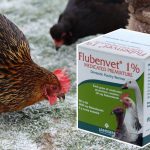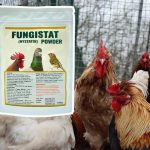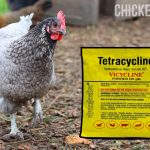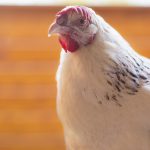Chicken Walking Like A Penguin: Possible Causes And Treatment
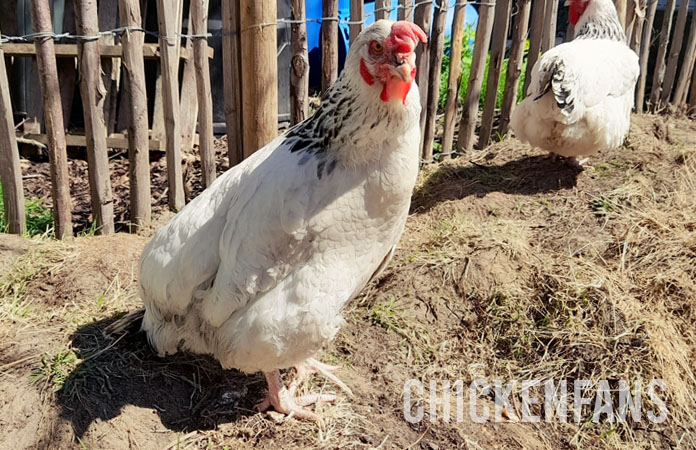
If your chicken walks around like a penguin, it may look peculiar and funny, but it probably is a sign of a severe underlying health issue. Egg-binding, egg yolk peritonitis, salpingitis, and ascites (water belly) are the most common potential causes that lead to penguin stand. All cases are severe conditions and should be treated immediately.
Let’s address all causes individually and provide all necessary treatment methods.
What Causes Penguin Stand in Chickens?
The so-called ‘penguin stand’ in chickens may be caused by egg-binding, egg yolk peritonitis, salpingitis (causing lash eggs), and ascites (water belly). These issues cause severe discomfort in the abdominal and reproductive area due to pressure or inflammation, leading to an upright posture. Prompt veterinary advice is essential for a correct diagnosis and treatment.
1. Egg Bound Chickens
Egg binding in chickens occurs when an egg becomes physically stuck in the oviduct of a chicken, typically between the shell gland and cloaca. This emergency situation renders the chicken unable to pass the egg without help, leading to the term ‘egg-bound’.
Egg binding is extremely dangerous to chickens. Affected hens are susceptible to multiple complications such as prolapsed vent, infections bleeding, or oviduct damage. If left untreated, this condition can be fatal.
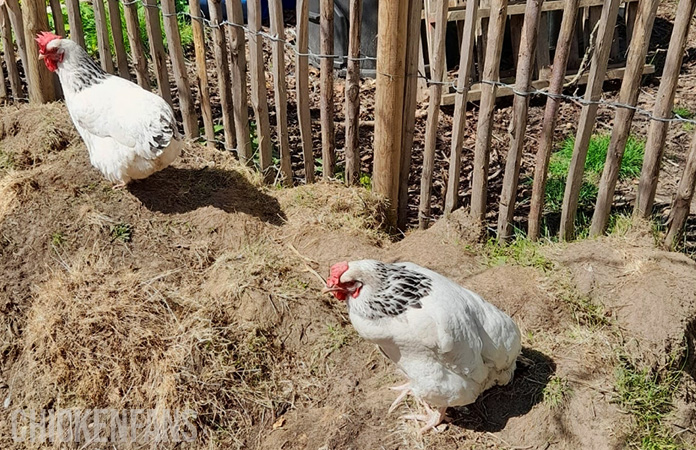
Symptoms of an Egg Bound Chicken
- Penguin Walk: Typical sign of egg-binding is a penguin stand
- Nestbox Sitting Behavior: Stays in the nesting box, but doesn’t lay
- Tail Pumping
- Distended Abdomen: The chicken’s abdomen will be significantly larger than usual
- Lameness: If the retained egg pressures the pelvic nerves, the hen may become lame
- Loss Of Appetite
- Diarrhea
- Constipation: Smaller chickens can be constipated instead of having diarrhea
- Altered Breathing: Heavy breathing (dyspnea) is possible if the retained egg pressures the air sacs
- Shaking: The constant straining and unsuccessful laying attempts result in exhaustion and shaking
- Cyanosis: The comb may turn blue-purple due to low oxygen levels
First Aid for Egg-Bound Chickens
- Calm Environment: Separate the egg-bound chicken from the rest of the flock and place it in a calm, stress-free, and temperature-controlled room.
- Rehydration: Rehydrate the chicken using water or electrolyte solutions. Remember that its natural fluid intake is decreased, meaning you will probably have to use a syringe or dropper. Adding calcium and vitamin D supplements is also recommended.
- Moist heat: Place the chicken in an incubator covered with wet towels or bathe the chicken in lukewarm water for 5 to 10 minutes.
- Lubricate the vent area: Lubricate the chicken’s vent area or cloaca using a lubricant gel.
Do NOT:
- Massage the abdomen, as you may break the egg
- Use vegetable oils for lubrication as they quickly go bad
- Postpone veterinary attention. You have less than 48 hours to remove the egg.
Treatment For Egg-Bound Chickens
Always seek veterinary advice when suspecting you have an egg-bound chicken. Depending on the severity of the condition and the egg location, the vet will suggest three treatment options:
- Medication: The vet will rehydrate the chicken with injectable fluids and give calcium and vitamin D. This approach is successful in mild cases.
- Percloacal Ovocentesis: If the egg is close to the cloaca, the vet may use a large-gauge needle to aspirate the egg content and cause the eggshell to collapse. This allows the empty shell to be removed or passed out naturally.
- Surgery: In severe cases, and when the egg is not visible, the vet must surgically remove the egg while the chicken is under general anesthesia.
2. Egg Yolk Peritonitis
Egg yolk peritonitis is the second possible cause for your chicken to walk upright like a penguin. It is a severe condition in chickens where the egg yolk splits into their body cavity instead of going through the usual path. This causes inflammation in the membrane covering the chickens’ organs, making them sit upright. Egg Yolk Peritonitis is a life-threatening situation.
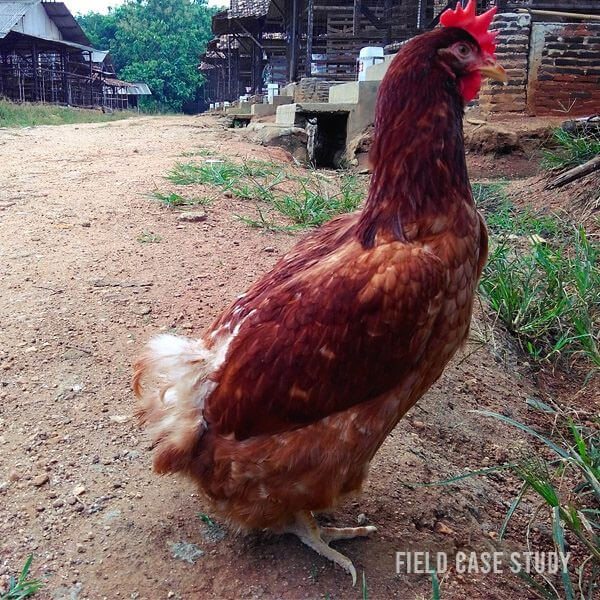
Symptoms of Egg Yolk Peritonitis
Symptoms of egg yolk peritonitis include:
- Penguin-like stance: Typical sign of egg yolk peritonitis
- Waddling gait
- Enlarged, hard abdomen: The chicken’s abdomen will be larger and harder than usual.
- Fewer eggs or no eggs at all
- Difficulty breathing
- Soft-shelled eggs
- Malformed eggs: Often elongated eggs or weirdly shaped eggs
- Lethargic behavior: Also calm behavior and spending a lot of time inside the coop
- Decreased appetite
Chickens with egg yolk peritonitis stop laying eggs or at least decrease egg production. If they continue to lay, the eggs are usually thin-shelled, soft-shelled, or otherwise deformed.
Treatment of Egg Yolk Peritonitis
The treatment for egg yolk peritonitis depends on the severity of the condition.
Milder cases can be treated with the following:
- Anti-Inflammatories (NSAIDs): For inflammation management
- Supportive Care: Isolating the hen and providing easy food/water access
In more severe cases, if there is an infection, the chicken needs more aggressive supportive care (intravenous fluids and oxygen therapy) and anti-inflammatories combined with:
- Fluid Drain: To decrease the abdominal distension
- Analgesics: To relieve the pain and provide comfort
- Antibiotics: to prevent and cure secondary infections
- Hormones: To stop egg production & avoid complications (leuprolide acetate, deslorelin)
- Salpingohysterectomy: Surgical removal of the oviduct
- Ovariectomy: surgical removal of the ovary is possible but dangerous and not recommended
Post-surgery complications with ovulation are typical, so gonadotropin-releasing hormones are recommended to control egg-laying.
3. Salingitis (Causing Lash Eggs)
Lash eggs aren’t real chicken eggs but round-shaped conglomerates of tissue and discharge from a chicken’s inflamed oviduct. Viral and bacterial infections, like Salmonella, MG, and E.Coli are common causes of Salpingitis. Treating lash eggs involves using antibiotics, such as tetracyclines, to address the underlying infection.
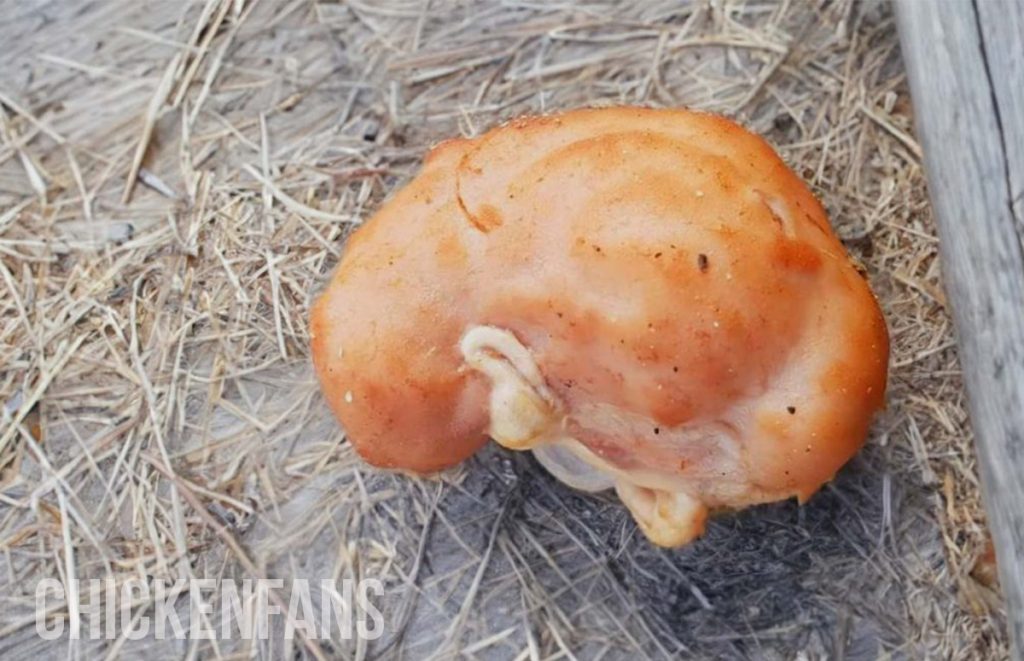
Symptoms of Lash Eggs in Chickens
Typical symptoms of Salpingitis are:
- Lash Eggs: finding fleshy meat lumps in the coop or nesting box is a typical sign of Salpingitis.
- Eggs with stress: If the hen is still laying you’ll fin lines if the hen is still laying.
- Soft-shell eggs
- Abnormally shaped eggs: Eggs with marks or weird shapes can be a sign of Salpingitis.
- Eggs that have streaks of blood on their shell
- Gradual weight loss
- Depression
- Heavy, enlarged abdomen
- Ruffled feathers
- Excessive thirst
- Labored breathing: mainly when associated with a respiratory infection
- Upright penguin stance
- Sudden deaths in the flock
It can be difficult for a chicken owner to understand exactly what’s wrong as the disease sometimes acts quickly. Still, in other cases, it can take up to several months for the bird to manifest a clinical picture.
Treatment of Lash Eggs in Chickens
Ideal lash egg treatment includes a detailed diagnosis and depends on the bacteria that cause salpingitis. Further treatment measures include:
- Use of antibiotics: often, tetracyclines are the go-to antibiotics, but Amoxicillin, Gentamicin, Penicillin, and Chlortetracycline are also used.
- Give your chicken a break from egg laying: through changes in environment, diet, and hormone levels, using antibiotics and anti-inflammatory drugs (NSAIDs like meloxicam).
- Use Prostaglandins, like PGE2: can help the chicken’s oviduct squeeze out pus, lash eggs, or fluid that might be stuck in there.
- Combine with retrograde flushing of the oviduct: Retrograde flushing is a medical procedure where saline is passed in via the vent to remove any blockages or buildup of material.
- Last resort is the surgical removal of the uterus and oviduct: As the problem will often return the only definitive treatment is surgery.
After your vet prescribes the antibiotic, you should consider administering it to the entire flock. If one of your chickens came down with a bad case of salpingitis, chances are that the rest of your birds are on the same path.
4. Water Belly (Ascites)
Water belly, also known as Ascites, is a severe condition in which chickens experience a swollen and mushy fluid-filled abdomen. This condition primarily affects broilers, chickens that are raised for meat production, in which the rapid growth of the chicken overwhelms its heart, resulting in increased blood pressure. This causes fluids to leak into the belly and lungs, potentially with a fatal outcome.
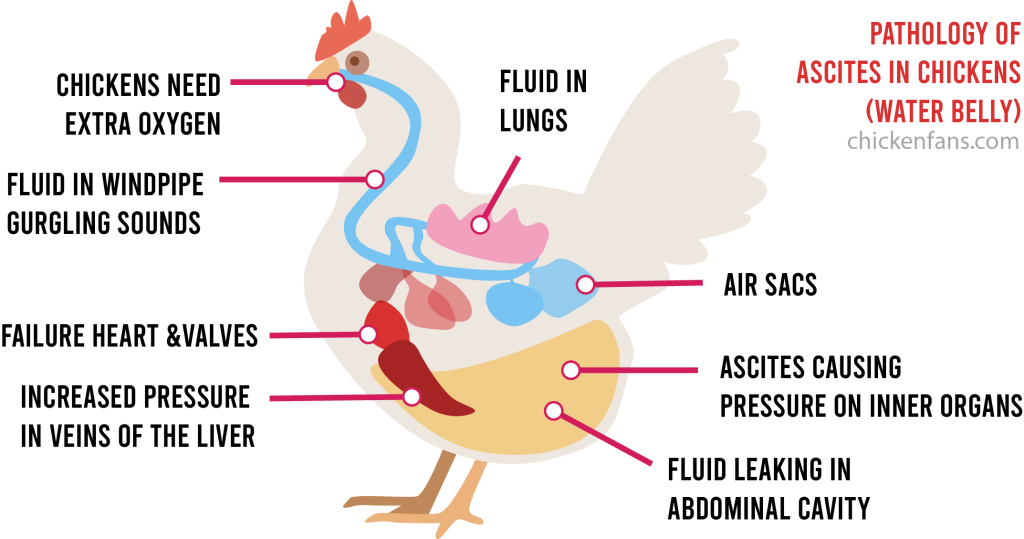
Symptoms of Water Belly
Symptoms of water belly in chickens include:
- Distended, swollen belly: a squishy belly filled with liquid
- Difficulty breathing: also includes panting, gurgling sounds, shortness of breath
- Pale, blue, or purple comb
- Red belly skin: including missing feathers around the belly area
- Impaired growth: abnormal rate of development compared to others
- Lethargy
- Acute death
How to Treat Water Belly in Chickens
To treat water belly (ascites) in chickens:
- Extract build-up fluid in the belly with a syringe. The first step is to use a syringe to drain the fluid in the belly, which will help to alleviate the pain.
- Adjust feed intake, temperature, and lower altitude: anything above 1500m/4900ft is inappropriate for raising meat chickens.
- Treat any secondary respiratory disease
- Apply medication like furosemide or digoxin
- Supplement with L-arginine, CoQ10, Omega-3, vitamin C, E
Initially, treating water belly, or Ascites, involves addressing the symptoms and using a syringe to drain the fluid in the belly. This will help to relieve the pain.
Nevertheless, it’s important to recognize that this approach does not resolve the underlying issue of pulmonary hypertension. This means the swelling in the belly may recur over time.
We advise seeking professional veterinary advice for fluid extraction, as it is essential to exercise caution to prioritize the well-being of your chicken.
Seek Immediate Veterinary Advice
Seeking veterinary advice is essential for chickens with conditions like Salpingitis, egg binding, egg yolk peritonitis, or ascites. While home remedies may relieve the pain temporarily, they won’t address underlying issues.
Professional veterinary diagnosis is crucial to identify the problem and provide proper medication and/or surgery. Trusting a veterinarian with your chickens is the best way to increase their chances of recovery.
Summary
A chicken walking like a penguin may suffer from severe underlying conditions such as egg binding, egg yolk peritonitis, ascites, or salpingitis. These conditions affect their mobility and cause discomfort. If you notice this behavior in chickens, taking immediate action and seeking veterinary attention is essential.
Proper veterinary care will improve the chicken’s chances of recovery.
If you’d like to learn more about chickens’ health issues, symptoms, treatments, and prevention methods, check out our Health Page. Our Symptom Checker can be helpful to any homesteader or chicken aficionado, and our ‘Chicken Behavior List’ can assist chicken owners in identifying possible medical conditions.
